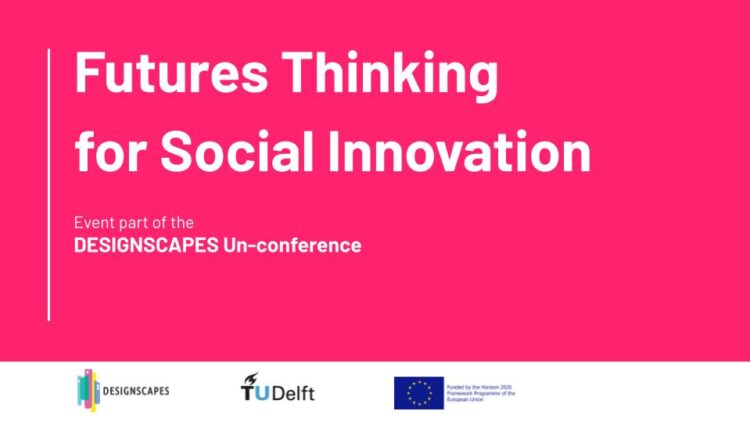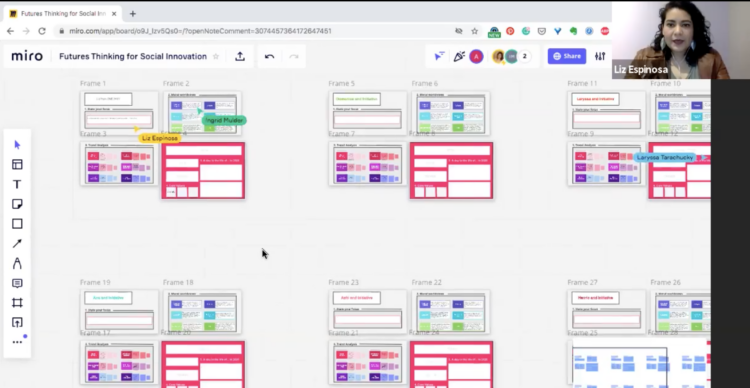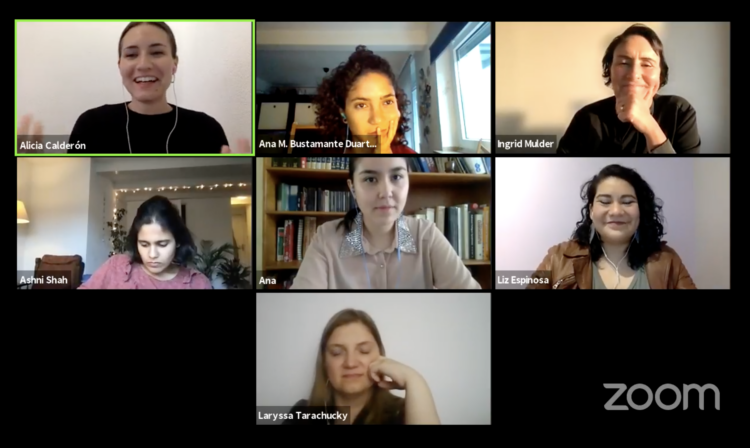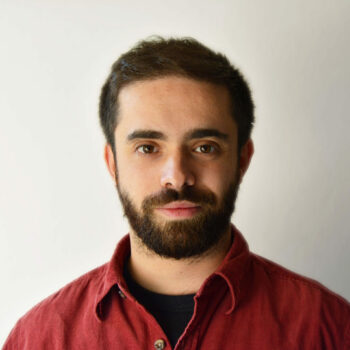Futures Thinking for Social Innovation
Alicia Calderon Gonzalez and Lizet Espinosa de la Rosa offered a training session to explore the application of Futures Thinking approaches for social innovation practitioners. The session sparked the interest of international practitioners in growing a community of practice to further diffuse these strategic capabilities within social innovation practice.
Futures Thinking as strategic ability for social innovators
Addressing complex societal challenges is increasingly asking innovation practitioners to go beyond simply reacting to the issues at hand. To ultimately stir social innovation and long-term change processes it is increasingly important to adopt visionary approaches, through which we can envision desirable futures for our society, and work out the strategies that can best help us to reach them.
Futures Thinking approaches have increasingly gained attention from innovation practitioners in different fields, including design. Rather than “predicting the future”, as one may intuitively think, Futures Thinking approaches are about looking at our past and present to gather evidence of how the process of change works over time, examining our goals and values to understand what is our preferred future, and finally prepare ourselves to test solutions to reach it. Applying future-oriented approaches, and even more, embedding them within innovation practice in systematic ways remains however easier said than done. Futures Thinking approaches are in fact not straightforward methodologies to apply within current innovation practices. On the contrary, scaffolding is required to make them actionable and concrete practices that can be more systematically embedded in innovators practice in order to develop a Future-oriented mindset and practice overall.
Since 2017, during her graduation project with the Participatory City Making Lab, Alicia Calderon Gonzalez has investigated how Future Thinking practices could become valuable and applicable tools for practitioners involved in social innovation. In particular, Alicia conducted a research project taking as a case study and end-user of Futures Thinking approaches the dutch strategic design studio of Morrow. Conducted through a combination of in-depth literature review and qualitative research methods involving Morrow expert designers, the research of Alicia provides insights on the value that the discipline of Futures thinking can add to Strategic design when designing for projects related to societal challenges. As part of the information reviewed to collect insights for the design of the tool, existing tools and methodologies of the disciplines of Strategic design and Futures thinking were analyzed during the research phase. Based on her findings, Alicia also developed a toolkit designed for Morrow to use Futures thinking and Strategic design to design for societal challenges.
After her project Alicia remained eager to further evaluate her insights with a broader range of social innovation practitioners, and reflect with them on the value and actionability of these innovative methodologies within their practice. The perfect chance to continue her research and capacity building work presented itself last September, during the European project DESIGNSCAPES. On the occasion of the DESIGNSCAPES Un-conference, the closing event of the three year research project, Alicia proposed a training module entitled “Futures thinking for social innovation” to share her insights with social innovation practitioners from Europe and beyond, and further explore with them the value of Futures Thinking approaches in fostering societal change.


The session “Futures thinking for social innovation”
To develop the session, Alicia worked in collaboration with Liz Espinosa de la Rosa, another alumna of the Lab also passionate about future thinking, and who had previously worked to scale the impact of grassroots social initiatives in the city of Rotterdam.
The event was introduced by Ingrid Mulder, director of Participatory City Making Lab and lead of the TUDelft team within the DESIGNSCAPES project, and led by Alicia and Lizet as an interactive session built in two main parts. In the first part of the session Alicia introduced to the audience the key features of the Futures Thinking approaches, explaining their connection and relevance to social innovation practice. After this introduction, Alicia presented a selection of activities derived from her previous research and toolkit, that could help innovators reflect on how to implement these approaches within their own practice of social innovators.


In the second part of the session, Lizet facilitated a co-creative activity with the participation of several international social and urban innovators. Through this interactive activity, the aim was to discuss and learn more from their perspective about the value of future thinking activities as well as their practical application as strategic tools in the work of innovators.
In particular, Alicia and Lizet prepared on a Miro board a series of activities through which each participant could be guided to experience directly some of the main steps of Futures Thinking.
The first exercise, State your focus aimed at helping participants make the scope of the exercise explicit for the session. The second step, Moral worldviews, helped participants to set a specific mindset while thinking about the future. Through the third step, Trend analysis participants then reflected on how different sectors and perspectives inform and form future scenarios. This led to the fourth step Make your values explicit which focused on setting a clear guideline on the most influential values and how these can influence decisions in the long term. Finally the fifth exercise for participants triggered them to Create the day in the life of your initiative in 5 years, projecting the analysis made in the first four steps into visualizations of plausible and preferable futures.
At the end of the exercises, Alicia and Liz facilitated an open discussion with participants where each was invited to share impressions and opinions on the value of Futures Thinking approaches in their practice and on the tools and activities they had experienced.
Watch the full session at this link.
“The more of us are building these preferable futures, the more positive images of the future we will have in our society”
Overall, the session highlighted how Futures Thinking approaches are still relatively new to the field of social innovation. However, they do represent a promising tool for practitioners in this field. This value was evidenced by the interest and active participation of international practitioners and researchers in participating in the session organised by Alicia and Lizet.
The specific setup of the activity, designed to give the opportunity for innovators to ‘taste’ first-hand some of the activities distilled by Alicia that are at the core of the Futures Thinking approach, really sparked the interest of participants in trying to apply these techniques in their future work. “Thank you again for organizing this workshop and sharing your tool!”, one participant wrote to Lizet after the session, “It was really nice to use it as a participant and I think it can be really useful for our activities here”.
What we also learned from the conversations and reactions from practitioners in the session, is that not only there is fertile ground for Futures Thinking tools in the field of social innovation, but also the desire of a community of practice actively willing to share experiences in applying these pioneering approaches in working locally within their own communities. After exploring the potential of Futures Thinking activities in their practice, two of the participants who joined the session, invited Alicia and Lizet to collaborate with them in the future, to further embed the insights and tools shared in the session within some of their upcoming academic projects on social innovation and participatory city-making. After all, visualizing a positive plausible future not only can inspire an organization but could even act as a catalyst for social innovators to organize and build together more resilient communities of practice.
Last but not least, the enthusiastic reactions from social innovation practitioners taking part in the session as well as the promising applications unveiled by their conversations once again confirmed Alicia and Lizet’s capabilities as trainers in support of social innovation practitioners. After the promising experience of this session, we trust that both will continue to leverage their expert skills to further diffuse innovative future-oriented approaches, enabling more and more practitioners to act strategically towards more desirable futures.
